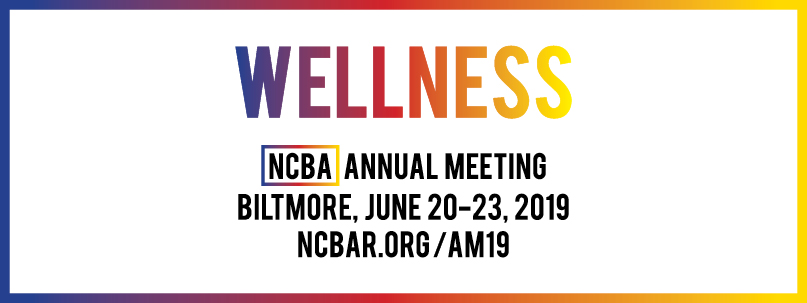Laura Mahr On Creating Mini-Moments Of Wellbeing
This year’s NCBA Annual Meeting theme is wellness and how legal professionals can achieve it. In preparation for the event, we talked with speakers scheduled to present at Annual Meeting for a series of quick-read Q&As. Read our Q&A with Jeena Cho and watch NCBarBlog for upcoming Q&As with April Harris-Britt, Stan Phelps and Greg Romeo. Admission to all speaker presentations, including those for CLE credit, is included in registration.
NCBA Annual Meeting 2019
Laura Mahr on Tapping into the Intelligence of the Body to Optimize Your Life
Saturday, June 22
CLE Credit: 1.0 hour
Find more details about Annual Meeting and registration here.

Laura Mahr is the founder of Conscious Legal Minds LLC, providing mindfulness-based coaching, training, and consulting for attorneys and law offices nationwide. Mahr’s work to build resilience to stress and burnout is informed by 11 years of practice as a civil sexual assault attorney, two decades of experience as a professional trainer, and 25 years as a student and teacher of mindfulness and yoga, and a love of neuroscience.
Q: Describe the three neuroscience-based tools your presentation will offer participants?
A: I will teach three tools that participants can use during their day to create what I call a “mini-moment of wellbeing.” The three “mini-moments of wellbeing” tools participants will learn are designed to help them do their work from an optimal state of physical calm and cognitive clarity. One tool will involve connecting with their nervous system to feel more calm, another will focus on tapping into their bodies to build their resilience, and a third will help them re-wire their brains to optimize their cognitive clarity.
Q: What is the difference between practicing law in responsive mode vs. reactive mode?
A: Neuroscience research found that our brains have two different operating modes: reactive and responsive. When our brains are in reactive mode, they are less effective — we think less clearly and our cognitive functioning is diminished. When our brains are in responsive mode, we both think better and feel better, resulting in increased efficacy and greater satisfaction in our lives. In my CLEs, I teach the tools that lawyers need to quickly switch their brains out of a reactive state and into a responsive state while they work.
Q: How are attitudes about wellness changing at the partner level in the legal profession?
A: This is a very exciting time for wellness at the firm level. Firm leaders are rapidly understanding that doing good business means feeling good while doing business. Law partners in our state and across the country are looking for new ways to support lawyers and support staff in feeling well. Increasingly, I am being contacted by firm management to offer mindfulness education for lawyers and support staff that teach tools that optimize physical wellness and cognitive capacity, while at the same time build a resilient firm culture.
Q: What is your hope for attorneys who complete one of your wellness-centered CLEs?
A: I want every attorney or judge that leaves my CLEs to feel empowered and hopeful about building new wellness practices into their day. Each CLE I conduct is organized around learning, practicing, and implementing new mindfulness and neuroscience-based tools. Each tool I teach is designed increase wellbeing and cognitive performance and decrease stress. My hope is that each participant chooses at least one of the cutting-edge mindfulness and neuroscience-based tools and tries it out, and then tries out another and another one when they see it making positive changes in their performance and wellbeing.

